Choosing the right landlord lock for your rentals is more important than you may realize. Not only is it the first line of defense for your tenants, but choosing the wrong landlord lock can also cost you in the long run.
The latest generation of re-keyable traditional locks and smart locks have come a long way. Finding the best landlord lock for your rental is harder than ever.
I’ve been adding smart home technology to my properties and was recently in the market for a smart lock. In the process of researching, I realized that there isn’t a straightforward buying guide for landlords when it comes to choosing the best landlord lock for rental properties. So I decided to create one.
In this article, I will:
- Show you why choosing the right landlord lock is important, and
- Explain the features that matter most when choosing a landlord lock
In the next article, I will compare a few of the better traditional and smart landlord locks so you can find the one that’s best for your rental properties.
Why Choosing The Right Landlord Lock System Matters
You may not have given much thought to which landlord lock system you chose for your rentals in the past but things have changed. Maybe you simply went with the most economical solution. However, now there are new smart features to consider and tenants have come to expect more convenience.
But which landlord lock system you choose has implications that you may not have considered. Here are a few reasons why choosing the best landlord lock system really matters.
Rekeying
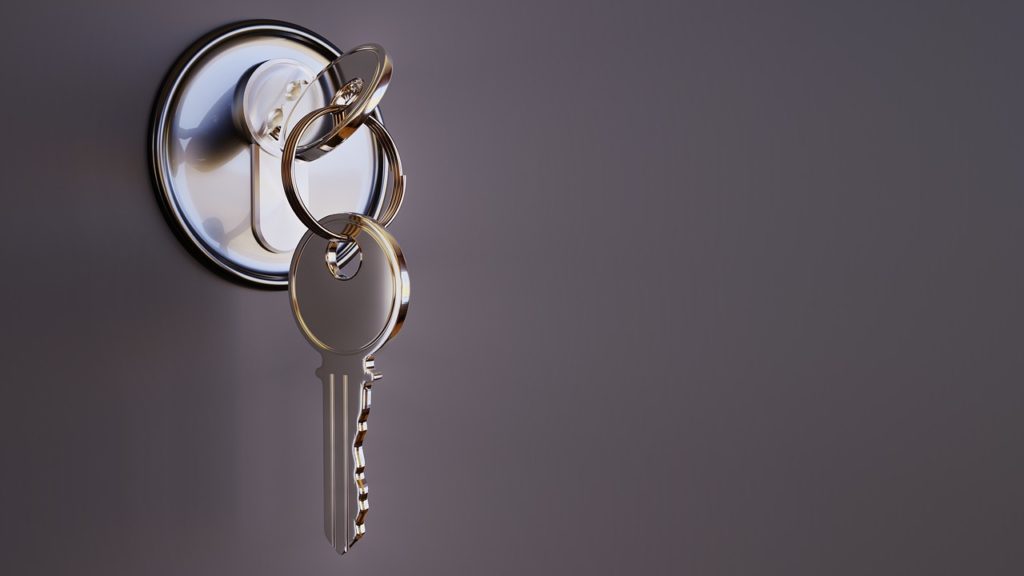
Many jurisdictions require you to change the locks after each tenancy of a certain length. Even if it’s not required, it’s still best practice. However, hiring a locksmith every turnover can be costly.
You may want to consider investing in a landlord lock system that allows you to rekey locks yourself. Some systems let you “reprogram” the pins with a new key in seconds such as the Kwikset Smart Key System. Others let you rotate key cylinders after each tenancy like LandlordLocks.
Either option requires a higher initial investment but will save you on locksmith fees in the long run. You can also turn over your properties quicker because you don’t have to wait for a locksmith.
Security
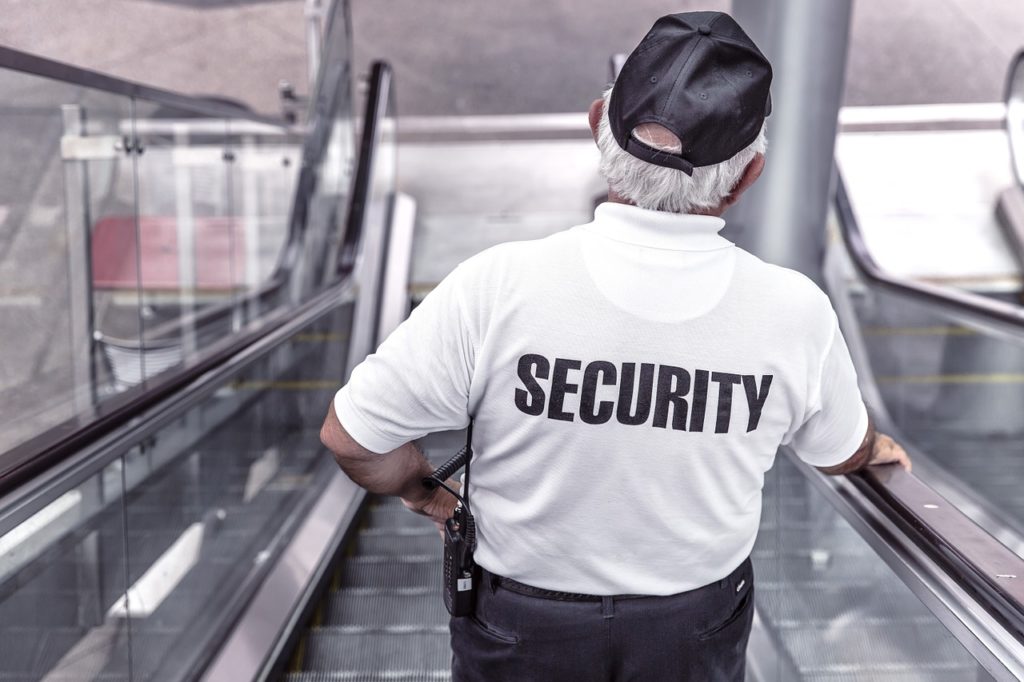
The safety and security of your tenants (not to mention your property) are at stake when you choose a landlord lock system. Here are few security features to consider.
Strength
Lock strength and material integrity is graded on a 3-point scale with a rating of 1 being the strongest. The scale is set by the Builders Hardware Manufacturers Association (BHMA) and accredited by the American National Standards Institute (ANSI).
Home Depot and other retailers let you filter searches by the ANSI grade.
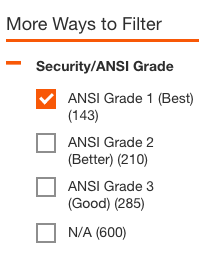
Check out Doorware.com guide to ANSI deadbolts below for details about the different grades.
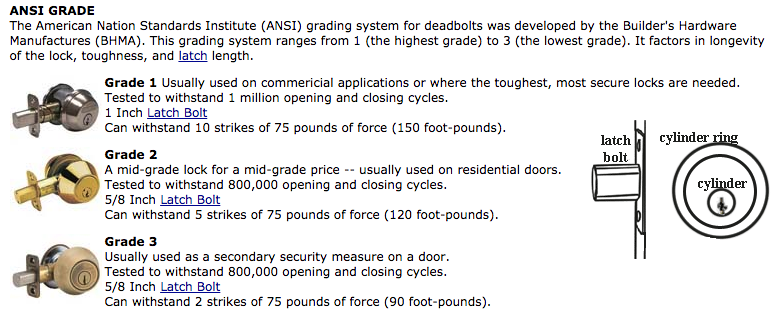
What Is Bumping?
Bumping sounds like something kids might be doing in a TikTok video but it’s even more dangerous.
Check out this terrifying video you should definitely watch about lock bumping.
If your rental is in a high crime area, then you should consider getting a premium lock from Medeco which can’t be easily bumped.
Alternatively, you can consider a smart lock without a keyhole such as the Nest x Yale Lock below.
Anti-Drill Protection
As a last resort, thieves can drill through the cylinder of most locks to bypass the pins and open the door. Consider investing in a lock with anti-drilling protection. They come with hardened steel that protects the lock mechanism so it can’t easily be drilled through or “attacked.”
Strike Plate
Perhaps the simplest and least expensive way to secure a door is to add a security grade strike plate.
A deadbolt is only as good as the strike plate itself. Adding a security grade strike plate makes it much harder for a burglar to get in by force.
Strike plates like the Prime-Line Latch Strike above are inexpensive but make it much harder to kick in a door because they anchor the strike plate with long screws and in more points.
Fire Code Rating
If you run a multifamily rental you are probably subject to stricter codes than single family homes. You should check the fire rating of any lock you plan to install because many towns require a higher fire code rating for multifamily locks.
Access Control
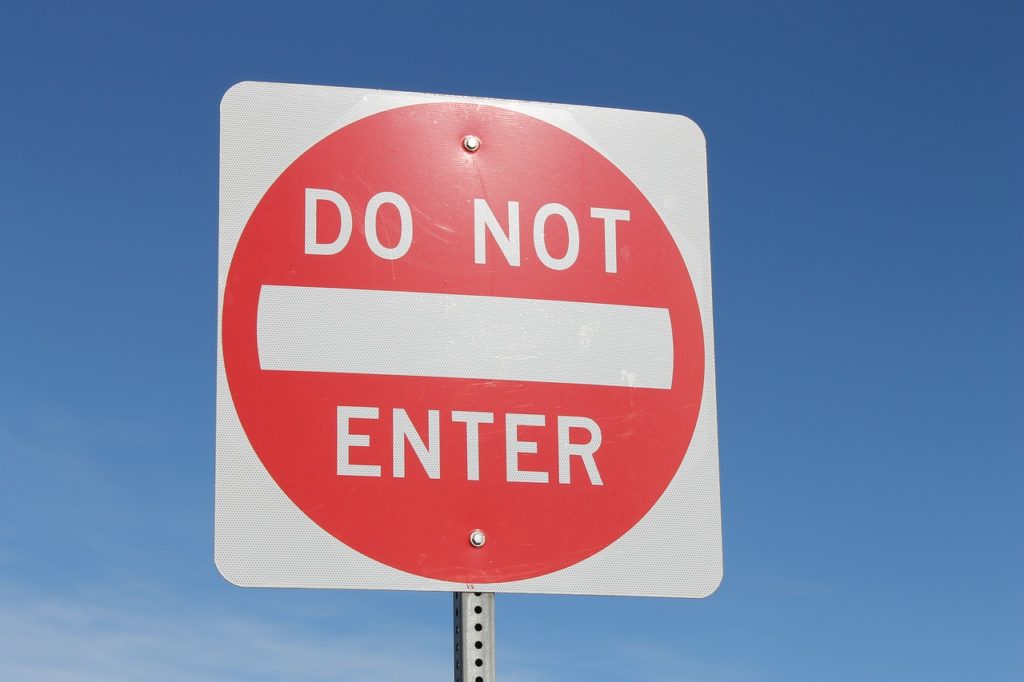
Landlords need to control who has access their properties. This was traditionally done by issuing a new key for each new tenant. However, this can get very complicated fast as you scale up your rental business. This is especially true if you are dealing with multifamily properties with common area access. Also, there’s no telling how many duplicate keys are out there.
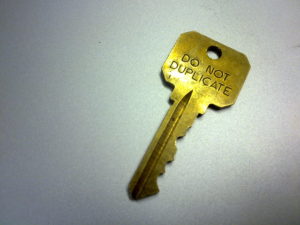
PRO TIP – A word of caution. Don’t expect a key marked “Do Not Duplicate” to be very effective at limiting access control. It’s essentially meaningless and most experts warn it does more harm than good by creating a false sense of security.
Master Key Systems

Master key systems can be configured to suit virtually any rental portfolio. A master key system allows two or more keys to open one lock. This is not only convenient because it reduces the number of keys a property manager needs to carry, but also increases security by restricting access to areas based on responsibilities.
For example, you can create a Master key that opens all the common areas but not the apartment doors. You can also create a Grand Master key that has access to all of those common areas and apartment doors. Great Grand Master keys can even be made to open all doors at all of your properties. You get the idea.
Remote Access
If you are a long distance DIY landlord or run a short-term vacation rental, then you need to invest in a remote access system. These smart lock systems allow to schedule access for each tenant or service provider. It’s essential if you need to allow potential applicants to view properties on their own. Check out this article on self-guided tours for more information.
They are WiFi enabled and allow you to manage and monitor the lock remotely. Some systems even integrate directly with vacation rental platforms such as Airbnb and will issue time-sensitive codes when your rental is booked.
Tenant Convenience

Today’s renters want to live a convenient lifestyle. They have dog walkers, nannies, house cleaners, etc. Tenants want and will pay for more convenience.
Adding a smart lock to your rentals can be a great way to provide more value by fitting with your tenant’s lifestyle. It can really make your listings stand out!
Here are few reasons to consider upgrading your landlord locks to suit your tenants.
Keyless Entry
Many new smart locks offer keyless entry options that unlock your door when your phone is close by. It works with the Bluetooth technology in your phone. This can be a great feature for tenants with kids (no keys to lose) or when they are carrying groceries into the house. It’s also great because they can avoid lost key fines.
Be sure to read the reviews for the lock you plan to buy. Some users report sketchy performance and difficulty installing some models such as the Kwikset Convert Smart Lock.
Entry Codes or eKeys
The best feature of smart locks is the ability to create custom access codes or eKeys as they are sometimes called.
Smart locks typically allow you to provide customized access in 3 ways:
- Always – Provides 24/7 access
- Scheduled– Create a custom access schedule for a babysitter, cleaners, vacation rental tenant, etc.
- Temporary – create a one time code for a contractor
The number of codes you can issue is virtually limitless so it can suit any rental portfolio. Also, codes can be issued or access can be revoked instantly.
Auto-Lock & Unlock
You can set some smart locks to automatically lock or unlock when you leave or approach the house.
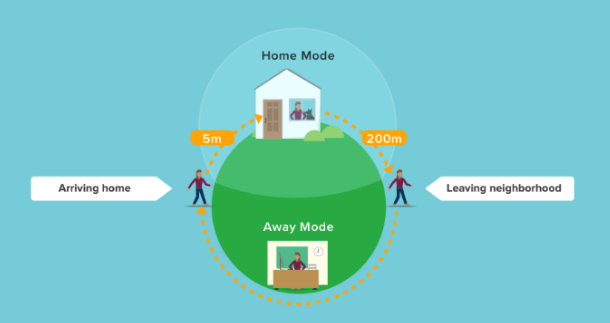
The August Smart Lock Pro can be set to auto lock up to 30 minutes after it senses the door is closed.
The August Smart Lock Pro can also tell you if your door is closed or open. However, this feature only works if your door is perfectly set in the doorframe. If you need to nudge your door in order to get the deadbolt to line up and lock, then auto lock and open door alert features can’t be used.
Remote Access
Remote access allows your tenants to remotely unlock the door. This is convenient when they need to let someone in the house while they are away during an emergency for example.
Smart locks with remote access can also make sense for landlords. They are necessary for vacation or short term rentals. They can eliminate the need to coordinate long distance repairs with tenant’s schedules. Many smart locks also keep a record of who used the door and when. A handy feature when you need to substantiate access to a rental unit.
Landlord Lock Features Landlords Should Consider
Choosing the right landlord lock system can make a big difference in your life as a DIY landlord but with so many features, it can be difficult to choose the best one. The explosion of smart locks on the market has increased the number of features available to landlords.
Here are a few of the more important features to consider when choosing the best landlord lock system for your rental properties.
Mode of Entry
Traditional Key
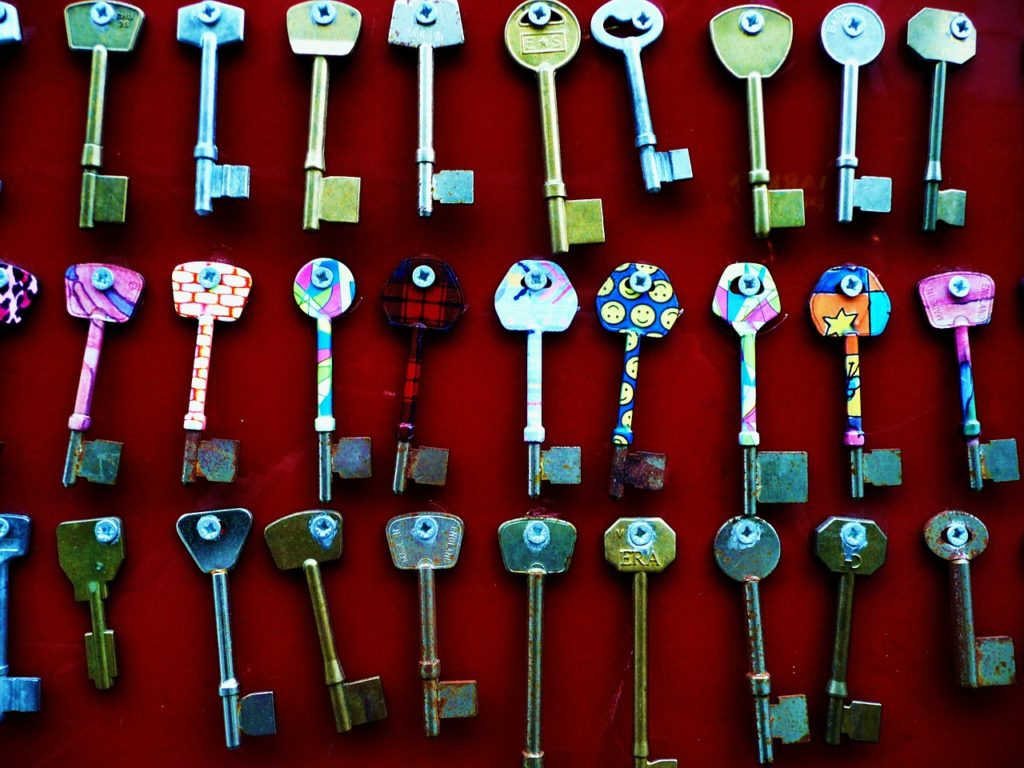
The traditional key hasn’t gone away just yet. Even most smart locks still include a traditional keyed entry. Most landlords probably aren’t ready or don’t want to rid themselves of the traditional keys. However, even traditional keys have gotten “smart” making a landlord’s life easier. See Kwikset Smart Key locks below.
Pros
- Easy to use
- Doesn’t require a power source
- Can use a master key system
Cons
- Can be lost
- Can be bumped
- Pins can wear out making access difficult
Keypad
Keypads come in push button and touch screen models.
Smart locks with button keypads like this Schlage Keypad Lock sold on Amazon are typically used for access to common areas such as garages and storage areas. The buttons tend to show wear over time so you either need to change the code often or risk a break in.
Touch screen keypad models like the Nest x Yale Lock eliminate the problem of wear out revealing the code numbers.
Pros
- Eliminate lockouts due to lost keys
- Autolock for extra security
- Limit access to certain schedules
- Some models create an access log
Cons
- Keypad buttons can wear down and reveal the code
- Can require a wired power source
Bluetooth

Bluetooth enabled smart locks can unlock your door when your phone is within 20 feet or so. These locks are supposedly intelligent enough to know if you are in the house or outside.
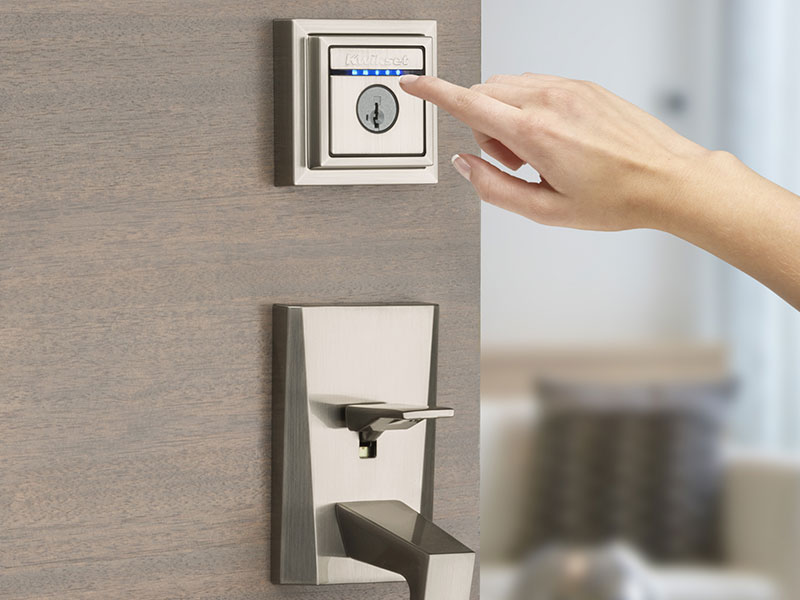
Some models like the Kwikset Kevo Touch-to-Open Smart Lock activates the lock mechanism when you touch the deadbolt.
Pros
- Convenient access
Cons
- Sketchy App and Bluetooth performance can leave tenants locked out
Key FOBs
Key Fobs use a special radio frequency to unlock the door when the fob or key card is held up to the receiver. They work just like your car FOB. These are typically used in commercial offices to control and log access.
Pros
- Reprogrammable keys to customize access real time
Cons
- Very expensive to install and replace lost fobs
- Requires a wired power source
Power Source
Battery Powered
Most smart locks use 4AA batteries. Batteries typically last between 3-6 months depending on the frequency of use. However, smart lock manufacturers do not recommend rechargeable batteries.
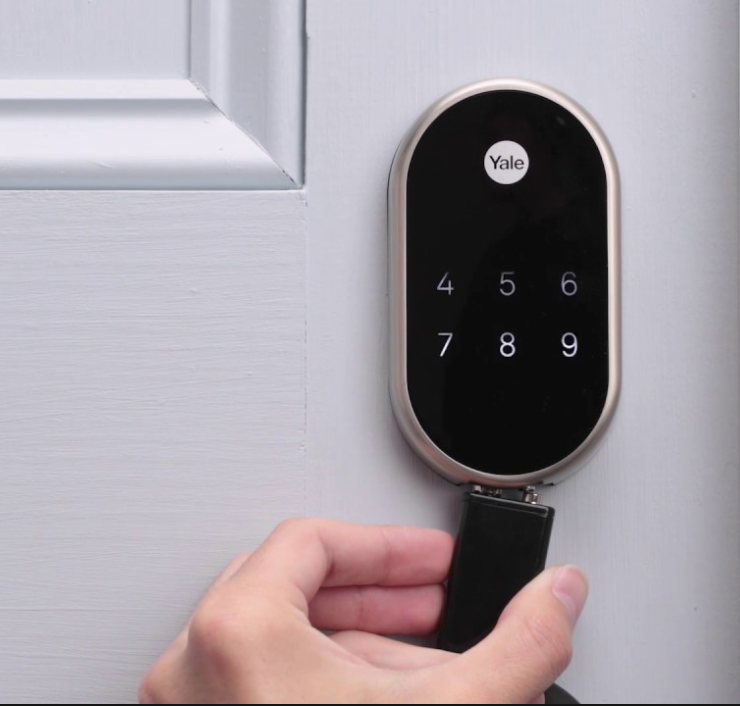
The Nest x Yale lock even has a neat feature that allows you to do an emergency charge with a 9V battery.
Pros
- Easy to replace batteries
Cons
- Replacing batteries can add up to $10 per lock per year
- Can result in lockouts if batteries not replaced when instructed
Electronic / Magnetic
These types of locks use electronic strike plates or magnets that open and close the door locks. Most residential properties aren’t equipped to run power directly to a doorjamb to accommodate an electric powered lock. This is typically only available in larger multifamily properties and condos.
Pros
- No expensive batteries to replace
- No lockouts due to dead batteries
Cons
- Initial set up costs can be high
- Doesn’t work if power is out (magnetic locks)
- Constantly “on” resulting in high electric bills
Access Control
Master Key System
Master Key systems make it possible for a landlord to minimize the number of keys needed to manage multiple doors. They also ensure tenants and property managers only have access to authorized areas. However, they can be expensive to set up and rekeying requires a professional locksmith.
Pros
- Numerous buildings can be keyed to the same grand master key
- Easier to manage fewer keys
- Limit access to authorized areas
Cons
- Higher up front costs
- Professional rekeying required
- Requires tight controls on master keys
eKeys
Smart locks eliminate the need for multiple keys. Instead, you can issue customized codes for everyone you need to give access to your rental. You can give 24/7 access to your tenants or just give access for the week if you are running a vacation rental business.
Pros
- No need to issue a physical key
- Grant access remotely (with WiFi)
Cons
- Apps can be buggy causing access issues
Ease of Installation & Rekeying
As a DIY landlord, you want to use a landlord lock system that is both easy to install and easy to rekey.
Retrofit Smart Lock
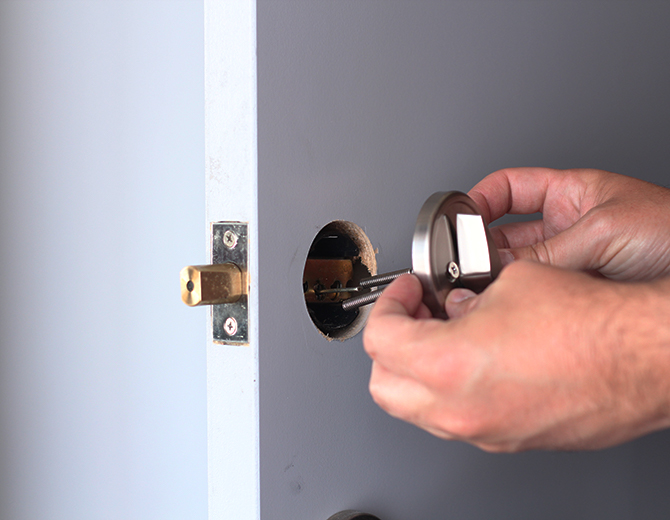
There are a few options to turn your existing deadbolt into a smart lock. The August Smart Lock Pro being one of the best choices in this class.
Pros
- Simple to install (Check out the August installation instructions)
- No need to replace existing hardware
- Works with most standard deadbolts
Cons
- High initial cost
- Will not work with Mortise type locks
DIY Rekey or Barrel Replacement
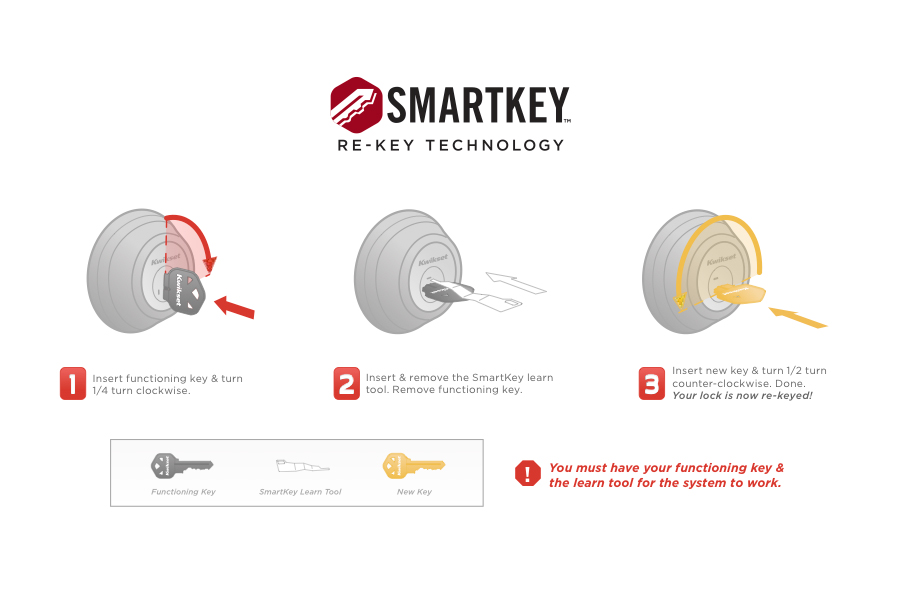
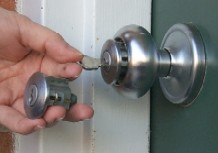
Some locks are designed to be rekeyed by landlords. The Kwikset Smart Key system and Landlord Locks are great examples of lock systems designed with landlords and property managers in mind.
Pros
- Rekey locks in seconds
- Some like LandlordLocks can be set up with a master key system
Cons
- High initial cost
Patented Key System
Patented key systems require a locksmith or authorized dealer to make a new key. It virtually eliminates the risk of multiple copies floating around which increases security.
Pros
- High security key control
Cons
- Requires a professional to rekey locks
Conclusion
Which landlord lock you choose for your rental properties matters. It secures your property and provides the first line of defense against break-ins for your tenants. New smart locks can also be a great selling feature by providing extra convenience.
Choose the landlord lock that provides the best combination of the features that matter most to landlords and tenants. These features include mode of access, flexible access control and ease of re-keying a lock.
If you want maximum security in a landlord lock, be sure to install ANSI Grade 1 locks.
If you are looking for maximum convenience and flexibility, you may want to go with a smart lock system. Just be sure to read the reviews of any smart lock you plan to use in your rentals as some of the bugs are still being worked out.
Stay tuned for my in-depth comparison of several of the landlord locks described in the article.
Which Landlord Lock Do You Use?
Which landlord lock works best for you? Do you use a combination of traditional and smart locks? Leave a comment.
Want More Landlord Tips?
Sign up today for the Accidental Rental monthly newsletter for more money saving tips and special offers!

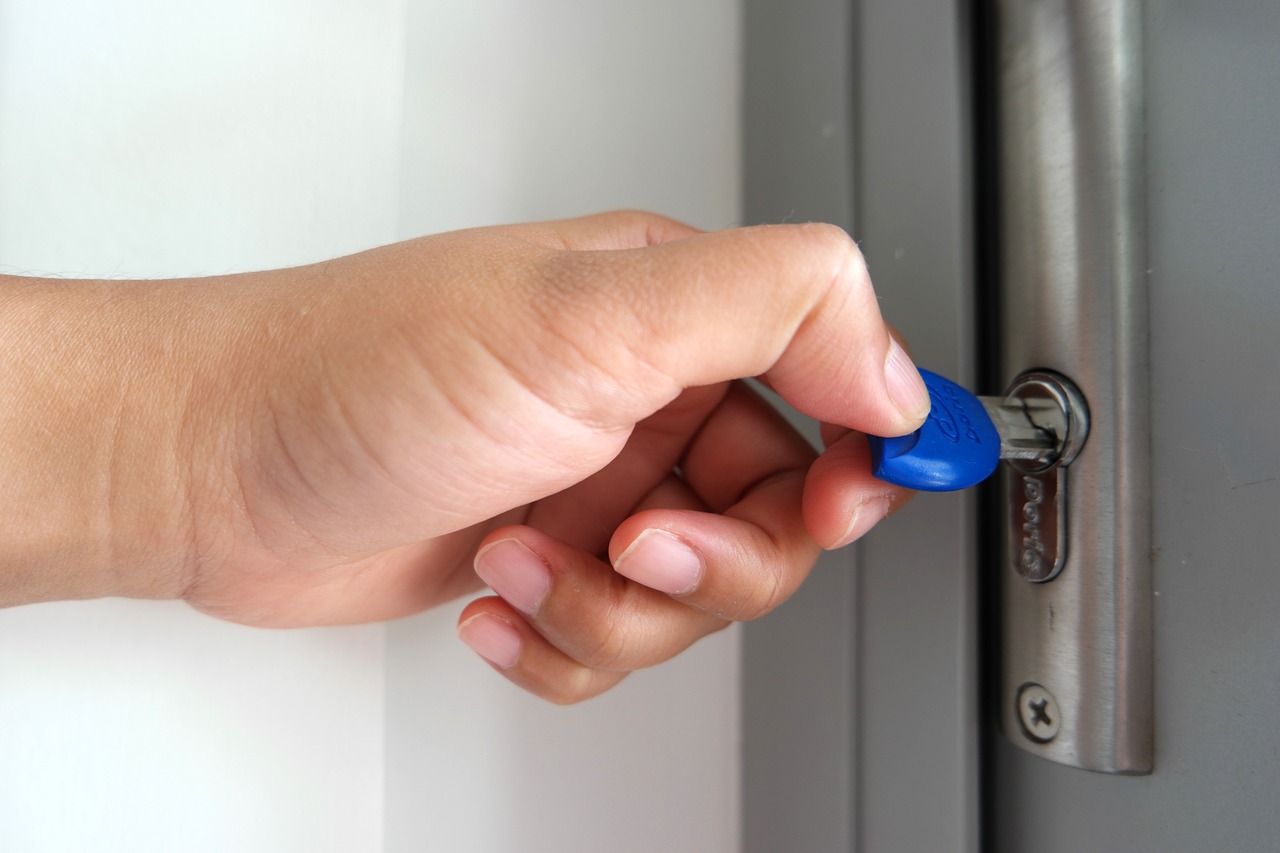




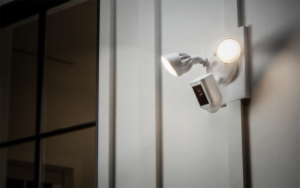
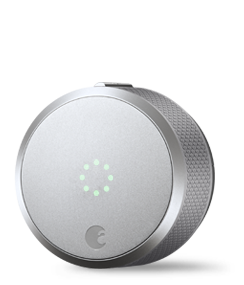

Thanks for the informative post! The blog is covering all the aspects but I have a question is smart lock durable?